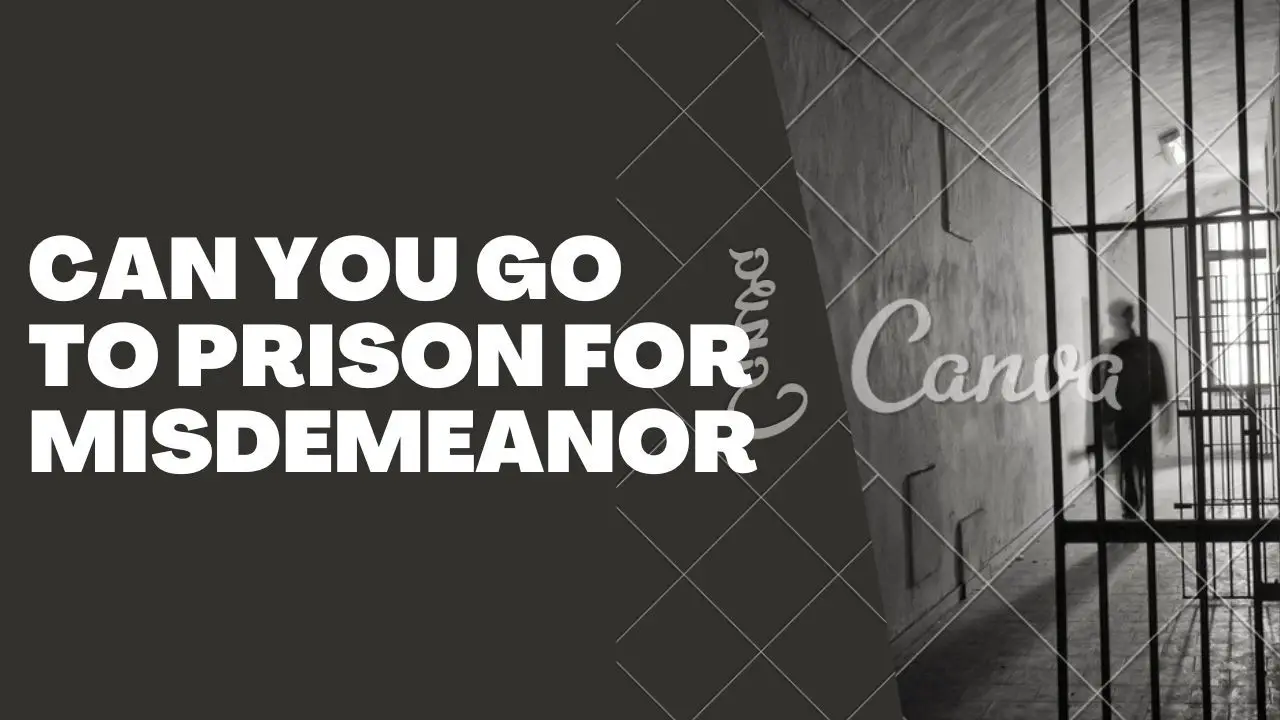Can You Go To Prison For A Misdemeanor
If you wonder, “Can you go to prison for a misdemeanor?” Yes, but not in most cases. Learn more here.

Going to prison is dreadful, especially when you know you can end up in jail even for minor crimes. Contrary to common perception, only criminals with serious crimes do not go to jail or prison. It leads us to a common question people often ask, "Can you go to prison for a misdemeanor?"
Yes, you can go to prison for a misdemeanor.
But what exactly is a misdemeanor, and how long do you go to jail for it? This article tells you everything about that.
What is a Misdemeanor?
Before we jump into the details of prison time and other punishments for misdemeanors, it is important to understand what a misdemeanor is.
Misdemeanors are minor crimes that do not cause serious harm to others. They include driving without a valid driver's license, shoplifting, disorderly conduct, shopping cart theft, trespassing, petty theft, vandalism, prostitution, stalking and carrying a gun without a permit, and possessing less than 20 grams of marijuana.
These crimes are not considered serious, so they may not lead to jail or prison time. The municipal or district court judge may order prison time if the accused has a past criminal record.
The maximum fine for a simple misdemeanor is $1,000, and such criminals do not have to spend more than 90 days of jail time. Some misdemeanors only have a fine of $300 or less.
Gross Misdemeanor
While we mention that a misdemeanor charge may not necessarily result in jail or prison time, a gross misdemeanor can be problematic. It includes reckless driving, third-degree theft, and fourth degree-domestic assault. Additionally, drunk driving may come under a misdemeanor instead of a felony if it's a first-time offense.
The judge may charge a penalty or fine for gross misdemeanors as well, but some charges have a mandatory minimum sentence. Thus, the judge cannot give a lesser sentence than the mandatory minimum. Gross misdemeanor charges usually result in $5,000 in fine, up to 364 days in jail time, or both.
Read Did Michael Desiato Go Back To Prison
Difference Between Misdemeanor and Felony
The American criminal justice system defines felonies as the most serious crimes, while misdemeanors are minor crimes. People committing felonies are more susceptible to hefty fines and long prison time, sometimes spending their whole life in prison. Felonies could be first-degree, second-degree, third-degree, life felony, or capital felony.
Meanwhile, misdemeanors are less serious crimes, and criminals do not always get a jail or prison sentence. The charges for a misdemeanor or felony depend on the crime's severity and present situation.
For example, driving under the influence is a felony in most US states and has serious consequences. However, if you are just slightly over the limit and if it is your first-time drunk driving, you may be charged with a misdemeanor and a warning.
Types of Punishments for Misdemeanors
Fine
While we mentioned that the answer to “Can you go to prison for a misdemeanor” is yes, it does not mean you always get a prison sentence.
Mostly, when charged with a misdemeanor, you will have to pay a fine depending on the severity of the crime. It also depends on your previous criminal record and other associated charges.
Jail Time
If the court believes that the crime is more severe than only imposing a fine but not severe enough to give prison time, jail time is the most suitable punishment. Criminals serving in jail do not stay as long as in prisons, and the overall environment is less strict with a flexible schedule.
Prison Sentence
As mentioned, some misdemeanor charges may also lead to prison sentences. Usually, a misdemeanor will land you in jail for up to a year. But if the judge sentences you to more than one year of incarceration, you will be sent to prison.
Difference Between Jail and Prison
When talking of "Can you go to prison for a misdemeanor" and being told about jail time, people often wonder, "Aren't jail and prison the same?" They are often used interchangeably but are not the same.
Jails are facilities opened by counties or cities to keep people when they are under police custody before conviction. Criminals to be moved to prisons may also be kept in jail for up to 24 hours.
A prison is a state or federal facility that houses criminals typically charged with felonies. Prisons can be minimum-security, medium-security, or maximum-security, depending on the type of criminals. They are extensive facilities with self-improvement programs, education, and facility jobs.
Jail Time for Classes of Misdemeanor
Misdemeanors are considered less serious than felonies and more serious than infarctions and are categorized into different classes with varying punishments. The maximum jail time for different misdemeanor classes is:
Class A: Six to twelve months
Class B: Thirty days to six months
Class C: Five days to thirty days
The maximum sentence in jail is up to two years. At the same time, felony criminals may be subjected to more than a year of prison time to life imprisonment or the death penalty.
Consequences of a Misdemeanor Charge
A misdemeanor charge might not give you jail or prison time, but it will leave a stain on your clean criminal record, leading to difficulties in the future. It can lead to jail or prison time if caught in a misdemeanor again. Moreover, potential employers might also be skeptical about hiring you when they learn about your misdemeanor charge during a background search.
FAQs
What is an infarction?
An infarction is a minor crime compared to a misdemeanor and usually results in nothing more than fines. It includes violating contracts and obligations such as speeding, parking misconduct, etc., leading to a minor penalty.
What's the worst misdemeanor you can commit?
First-degree misdemeanors are the most serious misdemeanors that can cost you $2,500 in fines and up to three months in jail for a first offense.
What is the most common misdemeanor in the US?
Alcohol-related crimes, petty theft, and trespassing on private property are the most common misdemeanors in the US.
What is the most common punishment for a misdemeanor?
Most misdemeanors have a punishment of less than a year with a $1,000 fine. However, the fine and jail time depends on the misdemeanor type.
Read more related articles;
